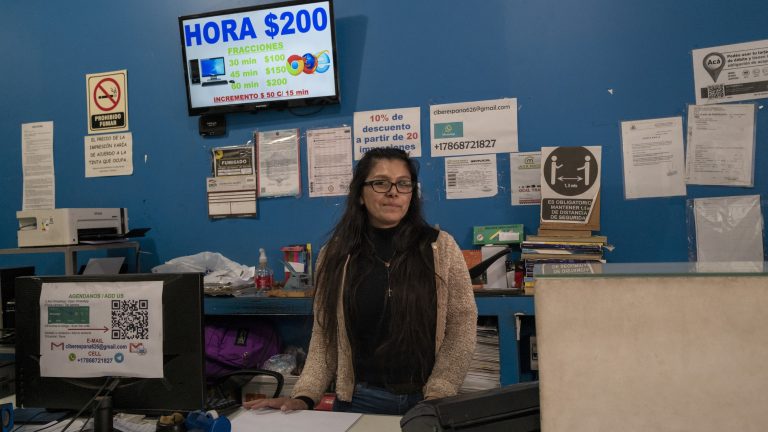jJust as the internet and internet cafes were taking off around the world, Argentina was experiencing one of the worst economic crises in its history. Triggered by a currency crisis that led to foreign debt default, in 2001 the country was on the brink of disaster. The banking system had collapsed and ATMs had been rendered unusable overnight. Protesters set up barricades, lit fires throughout Buenos Aires and targeted the presidential palace.
With the country’s unemployment rate at 23%, buying a PC was a distant fantasy at the time. Midrange desktop computers cost around $1,200, and private Internet access could cost as much as $30 an hour in a country where the average worker earned $870 a month.
This prompted Argentines to turn to the many internet cafes that emerged in the early 2000s. Buenos Aires was the first Latin American city to have one: the American Cybercaf, which opened in December 1995. The industry exploded for a few dollars, customers could rent a PC for an hour and escape into a digital universe. In 2004, 800,000 of Argentina’s one million new internet users frequented internet cafes, spending an average of $1.30 a week.
Two decades later, the country is experiencing another major crisis and for some, computer access is still a luxury. Although recent reports indicate that the majority of Argentines own a telephone (89.3%) and/or access to the Internet (88.4%), a much smaller percentage own a computer: just 39.2%. Due to recently devalued salaries, many still can’t afford laptops. The government has implemented currency control policies to safeguard scarce central bank reserves by making imported goods such as laptops, tablets, printers and other electronic devices more expensive.
The owners of Internet cafes said so Rest of the world the current economic crisis results in a small but constant flow of customers: those who generally use the telephone for most Internet activities, but visit the shops to print their documents. For senior customers, internet cafes are an important tool for booking appointments or paying bills online.
Rest of the world visited internet cafe in the city of Salta, located in northwestern Argentina. With more than 1 million people in and around the city, Salta is one of the largest urban centers in Argentina. It also has one of the highest connectivity rates in the country at 95%.
Locals said that 20 years ago Salta had more internet cafes than fast food restaurants. Today there are no more than a dozen left. The owners of Internet cafes said so Rest of the world the demand for internet access has decreased but they still manage to keep their shops open, day after day.
Cyber Spain
Los Molles neighborhood
On a recent afternoon, Melisa Duarte, an employee of Ciber Espaa, was busy painstakingly writing down the name and identification number of a senior customer so that she could book an appointment with the bank online. Filling out social security documents, printing, selling pens and notebooks, booking appointments: these are some of the many services that Ciber Espaa now offers to keep your business afloat.
Duarte, 38, has been working at Ciber Espaa since 2008, when it first opened. The space feels exactly stuck in the mid-2000s: the walls are covered in printed signs in Comic Sans; yellowed books lined up on the shelves. Located near the city’s main square, surrounded by banks and souvenir shops, it was once a thriving business, but its best days are behind us.
Ciber Espaa still offers customers 15 phone booths and access to more than 20 old-fashioned PCs, but Duarte said Rest of the world most of its business comes from other services. She said customers rarely use the phone booths, but teachers still use computers to prepare homework and students come by to do homework. Sometimes, remote workers book computers to hold Zoom meetings. In the day Rest of the world visited, only two computer workstations were in use. At one o’clock a young man was writing frantically and laughing; on the other, a man seemed to have fallen asleep in front of the screen.
People from the city’s suburbs, or even those who live in cities farther away, sometimes come in because the Internet isn’t very fast where they live, Duarte said.
After Duarte’s elderly customer had left, two teenagers holding sandwiches and a window cleaner approached the counter. Can we use a PC for an hour? they asked.
Duarte said he knew them. They work right outside the café, cleaning parked cars at traffic lights. Street kids come to play for an hour from time to time, he said. Then they will go back to work.
Orion Cyber 2
In the center
Fernando Herrera opened his first internet café, called Orion, in 2001. In the aftermath of the 2001 Argentine financial crisis, business was so good that he opened a second shop. Due to the devaluation of the currency, PCs were inaccessible to most people, so they queued up to use the computers in the coffee shops.
I swear, if I had 100 cars, they would all be booked up at all times, Herrera recalled. SaIta was full of internet cafes in those years if you could see two or three in a single block.
In 2015, Herrera closed its original store. Easy access to the Internet and the proliferation of tablets, laptops and smartphones had eaten up his business. In 2016, according to studies, 46.9% of the citizens of Salta had access to the Internet, at least through a mobile device.
It now has only Orion Cyber 2, its second store, with 23 PCs. On a recent visit, all the stalls were empty except one at the back where a guy wearing an Argentina football shirt was playing FIFA. Herrera said Rest of the world most of his customers are kids who come in to play League of Legends and Fortnite, as well as students or casual workers who show up to do some work.
Herrera, 43, said he has been predicting the death of his business for years now, but customers keep coming in. In Argentina, 40% of the population lives below the poverty line, and with 115% year-on-year inflation, many still can’t afford their own internet-enabled devices.
Cyber will be around as long as it’s still in crisis, because there are many people who can’t afford a computer, or a printer, or sometimes can’t even afford to fix them if they break, Herrera said.. This business started in the midst of a crisis and will live on as long as there is one.


Cyber S22
Finca Santa Anita
Ciber S22 is located five kilometers from the center of Saltas, in the popular neighborhood of Finca Santa Anita. Inside the internet cafe, owner Paola Vilte smiled as a chatty customer explained that she wanted to buy stickers for a horse show she planned to attend that weekend. I want to put them on my car windows and keep some to share with others [of the people], she said. Vilte designed the logo, with a horse drawn in the center, printed half a dozen stickers, and delivered them to the customer for less than 300 Argentine pesos ($1).
Vilte, 47, opened Ciber S22 in 2004. For 13 years, the internet cafe was her family’s main source of income. He remembers customers arriving from 9:00 to 1:00 at one point, she hired two assistants to split the long shifts. But as Internet access became more widespread, customers dwindled. Eventually, he changed his hours. Since 2017, Ciber S22 is only open from 9:30 to 13:00, and then from 16:00 to 20:00. The pandemic has taken a toll on businesses Covid-19 quarantine measures forced Vilte to close his shop for three months in the spring of 2020. To cope, he sold 14 of the shop’s 15 desktop computers.
Now, the Vilte family relies on her husband’s income from his job at the public electric company to pay their bills; coffee just brings extra money. Though she now only has one computer, Vilte has found a new way to run her own business: print stickers and logos, design postcards, and offer to help customers navigate online payment systems. Customers bring their gas, electricity and telephone bills and she helps them use the internet to pay them.
At the beginning of each month, Vilte receives a flood of customers who need help paying their bills, sometimes up to 50 customers a day. Later in the month, after business dries up, she uses the free time to focus on her new hobby: printing on mugs, clothes, and anywhere else you can print. During the pandemic, she has set up a small workshop in the back of the internet cafe.
On a recent afternoon, the only PC in the internet café was occupied by a man sending work emails. Vilte doesn’t want people using his PC to play games, he said, as he can’t stand the noise of the shooter games kids usually play.
Behind the counter where Vilte sits, a sign lists all the services it offers besides Internet access: card design, stickers, souvenirs, photo printing. Please ask for any other kind of services, he adds.


#Argentinas #economic #crisis #blessing #disguise #internet #cafes
Image Source : restofworld.org







